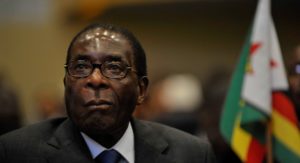DECEMBER 28, 2017
EDINBURGH — Zimbabwe lies in tatters, thanks largely to policies like land expropriation – yet the ANC leadership has committed to taking similar steps in the belief that the outcome will be different in South Africa. The ANC has resolved to grab land, without compensation, in a way that does not damage the economy or food security. But, that’s an impossible task, as seasoned journalist and media company boss Stephen Mulholland explains here. He cuts through the political message to explain why ANC plans to take land from productive farmers and hand it over to the traditionally disadvantaged beggar belief and urges clear thinking on the nuances of how the agricultural sector feeds into economic growth. Above all, Mulholland’s comment is a warning to new ANC president Cyril Ramaphosa that land expropriation without compensation will inevitably sentence South Africa to the Zimbabwean plight. – Jackie Cameron
By Stephen Mulholland*
“Conference resolved that the ANC should, as a matter of policy, pursue expropriation of land without compensation. This should be pursued without destabilising the agricultural sector, without endangering food security in our country and without undermining economic growth and job creation.”

Stephen Mulholland
Thus spoke the ANC at its recent Conference, an event referred to by members as if it were some sort of holy occasion such as a Eid Al-Fitr, celebrated at the end of Ramadan, a Papal gathering in St Peter’s Square or a Bar Mitzvah at the Wailing Wall.
Sadly it was a statement of total contradiction, an impossibility unachievable by any government, let alone our corrupt and incompetent ANC which would have difficulty running a bath, never mind a country.
It defies imagination that, with the ruin of Zimbabwe, a nation with no currency, a declining economy, daily job annihilation, health and education in tatters now staring us in the face, we choose to go down the same path to destruction along which the demented, thieving, dictatorial Robert Mugabe took his once thriving nation.
He drove away a few thousand white farmers, world renowned for their agronomic expertise, their products sought after all over the world
In 2015 the Washington Post sent a journalist to Zimbabwe. He reported: “When the Mugabe government started redistributing farmland in 2000, the biggest tracts went to supporters of the ruling party, even if the recipients didn’t know how to work them. White farmers, many of whom said they were ready to participate in a more orderly process of land reform, received no compensation when their property was seized.”
Today those white farmers are prospering in Australia, Canada, New Zealand, the UK, the USA and other countries happy to employ their skills and experience.
“If white settlers just took the land from us without paying for it,” Mugabe said, “we can, in a similar way, just take it from them without paying for it.”
 

File Image: Robert Mugabe, former president of Zimbabwe.
Oh, really? In the long and tortured history of mankind, surges of migration have been ceaseless as people sought kinder climates, more productive land, mineral wealth and on and on. There is no way the indigenous folks of the USA, Canada, Australia, New Zealand and others could today run the high tech, computerized and scientific agronomies that feed billions.
For example, in the USA in 1900 a population of some 100m was fed by 60% of their numbers working the land. Today that population is 330m who are fed, along with many millions of others around the world, by little more than 1% of the US population. Further, the US also maintains vast stockpiles of food to cater for droughts and other catastrophes including food for Third World victims of state corruption and incompetence.
Also read: Tendai Biti: Zim’s land question must end, time to compensate white farmers
The Washington Post added: “Driving around Zimbabwe today, it’s hard to miss the acres of farmland lying fallow. In 1997, the country’s economy was among the strongest on the continent. This year, its growth rate is predicted to be 1.5 percent(now below zero, of course) according to the government, lower than that of any of its neighbors. Between 2000 and 2009, agricultural revenue declined by $12 billion, according to the commercial farmers’ union. The nation, once called “the breadbasket of Africa,” relies on international aid to feed 25 percent of its population, according to the World Food Program.”
Before the ANC launches us on to Zimbabwe’s path to penury they might consider the following:
Sub-Saharan Africa uses the world’s lowest level of mineral fertilizers. For example, only 8 kg of nutrients are applied per hectare, which represents about 10% of the global average. It is estimated that Sub-Saharan Africa imports more than 90% of its agricultural fertilizers.
Access to water remains a great challenge. Presently, the use of motor pumps remains concentrated only in the northern and southern parts of Africa, which are the most arid regions, but also the most developed.
There are 36,000 commercial farmers in the country. South Africa classifies commercial farmers as those with more than 1,000 hectares of land.
Several crops produced in South Africa could be used to make bio-fuels. Sugarcane, sugar beet, maize, sorghum, and cassava can be used for ethanol production, while peanuts, jatropha, and palm oil can be used to produce bio-diesel.
Food loss and waste: According to the Facts and Futures report edition of Aug 2017, a total of 10 million metric tons of food go to waste in South Africa every year.

From left to right: Jesse Duarte (newly elected deputy secretary-general of the ANC), Ace Magashule (newly elected secretary-general), Gwede Mantashe (newly elected chairman), Cyril Ramaphosa (newly elected president), David Mabuza (newly elected deputy president) and Paul Mashatile (newly elected treasurer-general) celebrate on stage during the party’s 54th national conference in Johannesburg on December 18, 2017. Photographer: Waldo Swiegers/Bloomberg
Ramaphosa et al might also consider the Chinese experience. Recently China’s agriculture Minister Han Changfu said the country’s grain production capacity has reached new highs, with annual output exceeding 600 million tons for the last four years.
He added that science and technology is playing a crucial role in transforming Chinese agriculture, with the adoption of high-tech machinery seeing a move away from manual labour.
According to Han Changfu, the level of agriculture mechanization has been greatly improved with the comprehensive mechanization level of the main crops being well over 65 percent. In wheat production, an overall mechanization has been basically achieved. In corn and rice production, the mechanization level is over 75 percent.”
Meanwhile, the income of Chinese farmers has grown by nearly 50 percent over the last 5 years, with 7 million people having returned to the countryside to start new businesses. As more start-ups choose to settle down in rural areas, authorities say this could be a key growth point in the future. Han noted that this is mainly due to supply-side structural reform.
“We’re developing market-oriented agriculture, deepening the reforms and optimizing the agricultural structure. Produce processing, agricultural tourism and e-commerce are thriving, Agricultural industries are integrated. In 2016, the trading volume of produce e-commerce reached 220 billion yuan, and revenue of agricultural tourism was 570 billion yuan. We are seeing a more ecological, high-quality and safer agricultural production and supply,” said Han.
Presumably our future president could score some brownie points with his fellow party leaders by consulting the Chinese who, after all, remain communists. He should send our agriculture minister, Senzeni Zokwana, himself a communist, whatever that means today, to Peking for some instructions on how to grow an agronomy.
Ramaphosa needs to learn that you cannot have your cake and eat it. You cannot seize land from productive farmers, give it to neophytes and expect the nation to continue to be able to feed itself.
You might feel good and virtuous about righting ancient wrongs but you will be simultaneously sentencing your people to a Zimbabwean plight
Bloomberg profile: Stephen Mulholland serves as Non-Executive Chairman and Director of Connection Group Holdings Limited. Mr. Stephen became renowned as a journalist and editor in South Africa, before being appointed Chief Executive Officer of Times Media Limited in 1986. He left South Africa in 1992 to head the Fairfax publishing group in Australia, before returning to the country in 1996.

JACKIE CAMERON
DECEMBER 28, 2017 | CYRIL RAMAPHOSA, FEATURED, FOOD SECURITY, ROBERT MUGABE, SOUTH AFRICA, SPECIAL, STEPHEN MULHOLLAND, WEEKENDER, ZIMBABWE
The madness of land expropriation without compensation: Stephen Mulholland unpacks ANC plans

